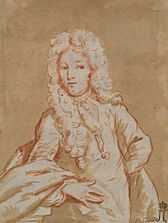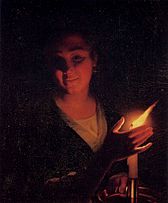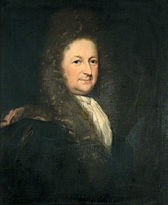Godfried Schalcken
Godfried Schalcken | |
|---|---|
 Self-portrait, 1679 | |
| Born | 8 October 1643 |
| Died | 16 November 1706 |
| Nationality | Dutch |
| Known for | Painting, Portrait painting |
Godfried Schalcken (8 October 1643 – 16 November 1706) was a Dutch artist who specialized in genre paintings and portraits. Schalcken was noted for his night scenes and mastery in reproducing the effect of candlelight. He painted in the highly polished style of the Leiden fijnschilders.
Life and work
[edit]Godfried Schalcken was born in Made, North Brabant, the son of Cornelis Schalcken and Aletta Lydius. Before he was four years old, his family moved to Dordrecht, where his father became rector of the Latin school. Schalcke studied under Samuel van Hoogstraten in Dordrecht before he moved to Leiden, into the studio of Gerard Dou (1613–1675), one of Rembrandt's most famous pupils. His earlier genre pictures very closely resemble Dou's work.[1] He worked in Leiden until c. 1675, then returning to Dordrecht until 1691, after which he settled in The Hague, where he continued to paint until his death, near age 63, in 1706. He also visited England (1692–1697), but his uncouth manners and bad temper alienated him from the society there. In 1703 he was employed by Johann Wilhelm, Elector Palatine in Düsseldorf. He died in The Hague.[citation needed]
Work
[edit]Schalcken painted several portraits, of which the half-length of William III of England, now in the Rijksmuseum, Amsterdam, is a good example.[1]
Like Dou, Schalcken specialized in small scenes lit by candlelight, a format favored by the Leiden fijnschilders. Examples are in Buckingham Palace, the Louvre, Vienna and Dresden.[1]
His painting, Lady, Come into the Garden (Buckingham Palace), was singled out by Schalcken's pupil and Dutch artistic biographer Arnold Houbraken as representative of his oeuvre.[citation needed] Other good examples are Old Woman Scouring a Pan and Soldier Giving Money to a Woman (London, National Gallery), Ceres Seeking Proserpine and Old Man Writing (Louvre), Woman (National Museum of Serbia), Girl Blowing Out Taper (Munich), Girl Reading Letter (Dresden Gallery), The Boy Angling (Berlin); and Toilet by Candle (The Hague). The Buckingham Palace collection also possesses an interior by Schalcken. His history paintings are less-well known. His pupils were Arnold Boonen, Godefridus Callenfels, Simon Germain, Carel de Moor, Richard Morris, Arent Pijl, his cousin Jacob Schalcken, his sister Maria Schalcken, and Anthony Vreem.[2]
- Godfried Schalcken
-
Portrait of a man
-
Portrait of Françoise van Diemen, his wife, in 1679 (marriage pendant to his selfportrait)
-
Artist and Model Looking at an Ancient Statue by Lamplight
-
Young Girl with a Candle
-
Young Girl with lemon
-
Young Girl with a Fish
-
Portrait of Sir Richard Levett, Lord Mayor of London, 1699.
-
Every One His Fancy c. 1670–1675. Rijksmuseum Amsterdam
In literature
[edit]
The atmospheric work of Schalcken provided the inspiration for Sheridan Le Fanu's gothic horror story "Strange Event in the Life of Schalken the Painter", which was adapted as Schalcken the Painter, and broadcast by the BBC on 23 December 1979 as part of its Omnibus series.[3]
Notes
[edit]This article includes a list of general references, but it lacks sufficient corresponding inline citations. (July 2013) |
- ^ a b c Chisholm 1911.
- ^ "Home Godfried Schalcken". rkd.nl. Archived from the original on 2016-03-06.
- ^ "BFI Screenonline: Schalcken the Painter (1979)". screenonline.org.uk.
References
[edit] This article incorporates text from a publication now in the public domain: Gilman, D. C.; Peck, H. T.; Colby, F. M., eds. (1905). "Schalcken, Godfried". New International Encyclopedia (1st ed.). New York: Dodd, Mead.
This article incorporates text from a publication now in the public domain: Gilman, D. C.; Peck, H. T.; Colby, F. M., eds. (1905). "Schalcken, Godfried". New International Encyclopedia (1st ed.). New York: Dodd, Mead.- This article incorporates text from a publication now in the public domain: Chisholm, Hugh, ed. (1911). "Schalcken, Godfried". Encyclopædia Britannica. Vol. 24 (11th ed.). Cambridge University Press. p. 312.
Further reading
[edit]- Complete text of Sheridan Le Fanu's short story
- DeGroot, Catalogue of Dutch Painters (New York, 1913)










